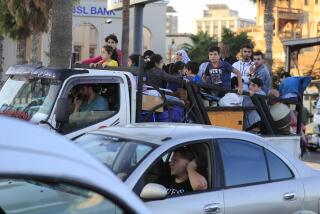Israelis, Palestinians Mourn Losses
- Share via
JERUSALEM — Israelis and Palestinians alike Thursday began burying their dead from the Gaza Strip’s worst spasm of violence in more than 3 1/2 years of conflict, as debate intensified over the presence of Jewish settlers and Israeli troops in the seaside territory.
Through a sunstruck afternoon and into a hot, dry dusk, the main Israeli military cemetery in Jerusalem held back-to-back funerals for four of six Israeli soldiers slain Tuesday. Their young comrades in the purple berets of their Givati Brigade wept openly at flower-bedecked graves.
More such funerals were to come. Israel on Thursday was preoccupied with retrieving any remains of five soldiers killed Wednesday when a powerful blast, eerily similar to the one a day earlier, hit a troop carrier packed with explosives in the southern Gaza Strip.
One of the six Israeli soldiers killed early Tuesday when their armored personnel carrier was blown up amid fighting on the outskirts of Gaza City was buried in his hometown outside Ashkelon, and another was to be laid to rest in his native Serbia.
The 11 deaths represented Israel’s worst two-day losses in Gaza since fighting between the two sides erupted in September 2000.
In Gaza City, Palestinian families wandered dazed and bereft amid the devastation left by two days of fierce fighting in what had been the bustling neighborhood of Zeitoun, on the city’s southern fringes.
Funeral marchers waving the green flags of Hamas and the yellow flags of Islamic Jihad wound their way through the shattered streets of the district, where battles between Palestinian gunmen and Israeli troops began at dawn Tuesday and lasted into Thursday morning.
In the aftermath, an already hardscrabble neighborhood was a shambles. Glass crunched underfoot, power poles leaned at angles, and water from pipes burst by the heavy treads of Israeli tanks pooled in streets and adjoining sand dunes.
More than two dozen Palestinians were killed in three days of intensive fighting in Gaza, hospital officials said. Eleven of the deaths occurred Thursday in two Israeli missile strikes in the southern town of Rafah, and a 12th man was shot dead in the northern Gaza town of Beit Hanoun, witnesses said.
During the Israeli incursion in Zeitoun -- which began with a predawn hunt by Israeli troops for workshops that make crude rockets and mortars for Palestinian militants to launch at Jewish settlements and Israeli towns -- hundreds of soldiers flooded the district, while tanks rumbled in the narrow streets and helicopters flew overhead.
After the Israelis withdrew, some Zeitoun residents who had huddled inside during the fighting were unable to make their way out through their rubble-choked doorways, and were forced to climb out their windows, surveying the scene in shock as they emerged.
“All this destruction is nothing more than revenge by the Israelis,” said Abed Abu Samra, a 55-year-old Palestinian laborer. “Everyone was hiding inside their houses -- we could do nothing.”
The Israeli chief of staff, Lt. Gen. Moshe Yaalon, went to Gaza to oversee the final phases of the fighting, which saw more clashes Thursday between Israeli troops and Palestinian gunmen. He said Israel would examine whether operational flaws had led to the soldiers’ deaths over the last two days.
“We will know exactly what happened only after we complete our inquiry,” he said.
So many combat deaths in so short a time threw Israel into an outpouring of grief that seemed to leave few in this small, tight-knit country unaffected. Hundreds of mourners packed each of the funerals held in succession at Jerusalem’s Mount Herzl cemetery, where Israel’s national heroes are buried.
One of the soldiers killed in Wednesday’s explosion of an armored personnel carrier was Lior Vishinsky, son of Shlomo Vishinsky, who is one of Israel’s best-known stage actors.
“The funeral cortege should leave from Likud headquarters,” a furious Vishinsky told reporters, referring to the conservative party of Prime Minister Ariel Sharon. On May 2, the Likud rank-and-file resoundingly voted down a plan to withdraw from Gaza.
Sharon is reworking his initiative but says its broad outlines will remain the same.
Khaki-clad soldiers wrapped their arms around one another during the burial of 21-year-old Eitan Newman, the son of a prominent Israeli medical researcher.
“How does one say goodbye to the little brother we loved so?” his brother, Zvi, said in a tear-choked eulogy.
Surveys have suggested that most Israelis support the prime minister’s plan to withdraw from 21 Jewish settlements in Gaza. Peace activists planned a rally Saturday in Tel Aviv to drive home what they said was widespread popular support for a Gaza pullout.
Special correspondent Fayed Abu Shammaleh contributed to this report from Gaza City.
More to Read
Sign up for Essential California
The most important California stories and recommendations in your inbox every morning.
You may occasionally receive promotional content from the Los Angeles Times.










